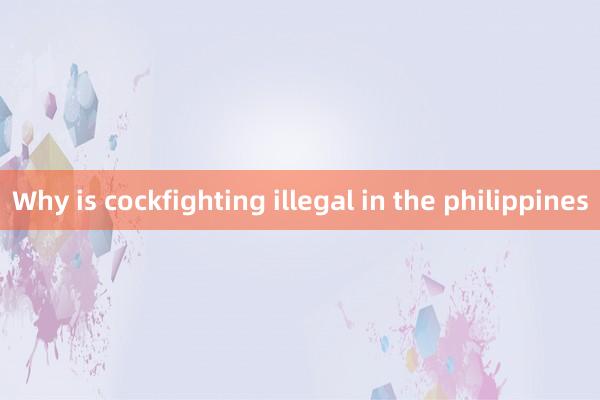Why is cockfighting illegal in the philippines

Why Is Cockfighting Illegal in the Philippines?
Cockfighting, also known as "sabong," has been a part of Filipino culture for centuries. It is deeply embedded in local traditions and has long been regarded as both a sport and a form of entertainment. Despite its cultural significance, however, cockfighting has faced increasing scrutiny over the years, leading to its eventual illegalization in various parts of the Philippines. To understand why cockfighting is now banned, it's essential to explore the social, ethical, and legal reasons behind this decision.
1. Animal Cruelty Concerns
The most prominent reason why cockfighting is illegal in the Philippines today is due to concerns about animal cruelty. In cockfighting, roosters are specifically bred and trained for aggression. Razor-sharp blades are attached to their legs, and the birds are forced to fight until one is severely injured or killed. The violent nature of the sport has led to widespread condemnation from animal rights groups and advocates, who argue that it subjects animals to unnecessary suffering for the sake of human entertainment.
In 1998, the Philippines enacted the Animal Welfare Act, which aims to protect animals from harm and cruelty. Cockfighting, which clearly violates the principles outlined in this law, was increasingly viewed as a practice that conflicted with modern ideas about humane treatment of animals. As global awareness of animal rights grew, the movement to ban cockfighting gained momentum.
2. Public Health and Safety Issues
Cockfighting events often attract large crowds, which can pose significant public health and safety concerns. In the past, these gatherings have been known to turn violent due to gambling disputes, illegal betting, and alcohol-fueled altercations. Fights and brawls can break out in cockpits, endangering the lives of those in attendance.
Moreover, the COVID-19 pandemic accelerated the push to ban cockfighting when it was revealed that illegal cockfighting events, known as "tupadas," contributed to the spread of the virus in some communities. Authorities found that these gatherings, which were often held in cramped spaces without proper health protocols, acted as super-spreader events. This created a public health crisis that led to the closure of cockpits and the stricter enforcement of laws against the practice.
3. Gambling-Related Issues
Another significant factor behind the banning of cockfighting is the negative impact of gambling, which is inherently tied to the sport. While gambling on cockfights has long been part of the tradition, it has also led to a variety of social problems. Many individuals have found themselves deep in debt, families have been financially ruined, and communities have been divided due to disputes over betting outcomes.
Illegal gambling syndicates often exploit cockfighting to engage in money laundering and other criminal activities. These underground betting operations are difficult to regulate, and law enforcement has struggled to keep criminal elements out of the sport. By making cockfighting illegal, the government aims to curb the growth of these illegal gambling networks and protect vulnerable individuals from the destructive consequences of excessive gambling.
tải go884. Shifting Cultural Attitudes
Over time, there has been a noticeable shift in cultural attitudes toward cockfighting. Younger generations, in particular, are less inclined to view the practice as a necessary or acceptable form of entertainment. As urbanization and globalization continue to influence Filipino society, many people have started to embrace more modern and humane perspectives on animal welfare and entertainment.
In addition, increased exposure to international norms and practices has led to greater awareness of the ethical issues surrounding cockfighting. While some traditionalists argue that cockfighting is a part of the country’s heritage, others believe that it is an outdated and brutal practice that no longer has a place in modern society.
5. Government Efforts to Preserve Social Order
The Philippine government has long sought to maintain social order by addressing activities that contribute to societal instability. Cockfighting, due to its association with illegal gambling, violent altercations, and public health risks, has become a target of government intervention. By outlawing cockfighting, authorities hope to reduce the negative social consequences that often accompany it and promote a more peaceful and orderly environment.
Additionally, the illegal status of cockfighting allows law enforcement to crack down on other related criminal activities, such as drug trafficking, which often occurs in conjunction with illegal cockfights. The ban is part of a broader effort to address the root causes of crime and unrest in certain areas.
Conclusion
While cockfighting has long been a significant part of Filipino culture, the reasons for its illegalization are clear. Concerns over animal cruelty, public safety, gambling issues, and shifting cultural attitudes have all contributed to the growing movement against the practice. The Philippine government’s decision to outlaw cockfighting reflects a desire to protect both animals and citizens from the harmful effects associated with this once-popular sport.
As society continues to evolve, it is likely that cockfighting will remain a controversial subject. However, the efforts to ban it indicate a growing commitment to ethical principles, animal welfare, and the promotion of a safer, more harmonious society.
Jili77 login registerwww.nickelback-forum.com

